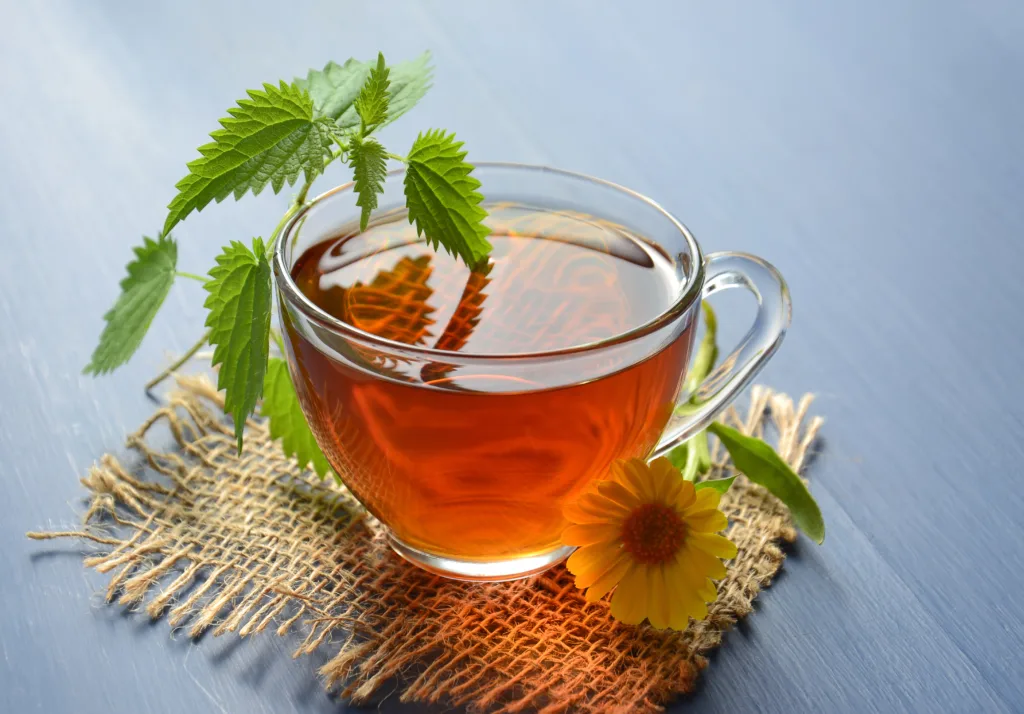Chamomile tea is a popular drink that many people enjoy for its soothing and calming effects, but if you have Irritable Bowel Syndrome (IBS), you may be wondering if it’s safe to drink.
For those who follow the Low FODMAP diet, the answer can be confusing. Is chamomile tea low FODMAP? If you’re like many IBS sufferers, this is a question you may have asked yourself as well.
In this article, we’ll discuss whether chamomile tea is low FODMAP and how it fits into the Low FODMAP diet. We’ll also look at how to make chamomile tea low FODMAP friendly. So if you’re looking for answers to your questions about chamomile tea and FODMAPs, read on!
FODMAP stands for Fermentable Oligosaccharides, Disaccharides, Monosaccharides and Polyols. It is a group of carbohydrates that are difficult for some people to digest, and can cause digestive symptoms such as gas, bloating, abdominal pain and diarrhea. Following a low FODMAP diet can help reduce these symptoms.
Irritable Bowel Syndrome (IBS)
Irritable Bowel Syndrome (IBS) is a common disorder of the digestive system. It is a chronic condition that affects the large intestine, causing abdominal pain and changes in bowel movement habits. Symptoms of IBS can vary from person to person, but may include abdominal pain or cramping, bloating, gas, diarrhea and constipation. People with IBS may also experience fatigue, anxiety or depression. Although IBS is not life-threatening, it can have an impact on quality of life and daily activities.
IBS is thought to be caused by a combination of factors including genetics, diet, stress and hormones. While there is no cure for IBS, there are treatment options available to help manage symptoms. These include lifestyle changes such as reducing stress levels, eating a healthy diet and getting regular exercise. Medications such as antispasmodics or laxatives may also be prescribed to help relieve symptoms. In some cases psychological therapy may be recommended to help manage stress levels and reduce flare ups of symptoms.
It is important for people with IBS to get an accurate diagnosis from their doctor so that appropriate treatment can be prescribed. It is also important to keep track of any changes in symptoms or flare ups of pain so that the doctor can adjust treatment accordingly. With proper management and lifestyle changes it is possible for people with IBS to lead a full and active life.
What is Chamomile Tea?
Chamomile tea is an herbal infusion made from dried chamomile flowers. It has a light, sweet taste and is often served hot or cold. The tea has been around for centuries and is still popular today. It has a number of potential health benefits and can be used to help treat a variety of health issues. Chamomile tea is made by steeping dried chamomile flowers in hot water for several minutes. The resulting beverage has a light, sweet flavor and can be served either hot or cold.
Chamomile tea is said to have numerous health benefits, including reducing stress and anxiety, improving digestion, helping with insomnia, treating colds and flu symptoms, relieving pain and inflammation, and even fighting cancer. Studies have shown that chamomile tea may help reduce levels of cortisol in the body which is the hormone associated with stress and anxiety. It may also help to improve digestion by reducing stomach acidity levels. In addition, it might help relieve symptoms of insomnia by relaxing the body and aiding in restful sleep.
Click here to preview your posts with PRO themes ››
Chamomile tea can also help to ease colds and flu symptoms such as sore throat or congestion. Studies have shown that it may reduce inflammation in the body, which could help to reduce pain associated with conditions like arthritis or muscle strain. Furthermore, some studies suggest that drinking chamomile tea could even offer protection against certain types of cancer such as breast cancer or colon cancer due to its anti-inflammatory properties.
Overall, chamomile tea is an incredibly versatile beverage with many potential health benefits. It can be enjoyed hot or cold and makes for a pleasant drink any time of day!
Is Chamomile Tea Low FODMAP?
Chamomile tea is generally considered to be low FODMAP, however it is important to note that some people with IBS may find that it does not agree with them. This is because chamomile is known to have a natural compound called sesquiterpene lactone, which can trigger digestive issues in some individuals. It is best to experiment and observe your body’s response after drinking chamomile tea. If you experience any digestive distress or discomfort, then it may be best to avoid consuming chamomile tea.
It is also important to note that if you are buying pre-packaged chamomile tea, then you should check the ingredients list for any added sugars or other high FODMAP ingredients. Additionally, the amount of chamomile used in the tea will vary between brands, so this should be taken into consideration when assessing your tolerance level.
In summary, chamomile tea is generally considered to be low FODMAP but it is important to consider your individual tolerance level and read the ingredients list on pre-packaged teas before consuming them.
The Benefits of Drinking Chamomile Tea
Chamomile tea is a popular herbal beverage, made from the dried flowers of the chamomile plant. It has been used for centuries as a medicinal drink, and it’s known for its many health benefits. Here are some of the top benefits of drinking chamomile tea:
One of the most well-known benefits of chamomile tea is its calming effect. It can help to reduce stress, anxiety and insomnia, making it a great choice for those who struggle with sleep issues. The tea contains compounds like apigenin and luteolin, which have been shown to have relaxing properties.
Chamomile tea is also said to have anti-inflammatory properties. Studies have found that it can help to reduce inflammation in the body, which can lead to a number of health benefits including improved digestion and better overall health. The tea also contains antioxidants that can help protect against cell damage caused by free radicals.
Studies have also shown that chamomile tea may be beneficial for those with Type 2 diabetes. The tea may help to regulate blood sugar levels, as well as reduce insulin resistance in those who are experiencing high levels of glucose in their blood stream. Additionally, the antioxidants in the tea may help to protect against diabetic complications such as nerve damage and eye disease.
Click here to preview your posts with PRO themes ››
Finally, chamomile tea may be beneficial for skin health. The antioxidants in the tea can help to protect against skin damage caused by UV rays, while its anti-inflammatory properties can help to soothe skin irritation and reduce redness. The tea may also be beneficial for those with acne or eczema due to its anti-bacterial properties.
Overall, there are many potential benefits associated with drinking chamomile tea. From reducing stress and anxiety to improving skin health and blood sugar regulation, this herbal drink could be an excellent addition to your daily routine.

Chamomile Tea and IBS Symptom Management
Chamomile tea is a popular herbal tea made from the flower of the chamomile plant. It has been traditionally used for medicinal purposes for centuries, and is known for its calming effects. Recently, chamomile tea has been studied as a potential treatment for Irritable Bowel Syndrome (IBS). IBS is a chronic condition characterized by abdominal pain, bloating, constipation, and/or diarrhea. While there is no cure for IBS, proper management of symptoms can help reduce discomfort and improve quality of life.
Studies have shown that chamomile tea may be beneficial in managing IBS symptoms. It is thought that the active components in chamomile tea may help to relax the smooth muscles of the digestive tract and reduce inflammation in the gut. Chamomile tea has also been found to reduce stress and anxiety levels, which can exacerbate IBS symptoms. In addition to these benefits, chamomile tea may also help to reduce abdominal pain and improve overall digestive health.
It is important to note that chamomile tea alone should not be relied upon as a treatment for IBS symptoms; rather it should be used in conjunction with other treatments recommended by your doctor. Additionally, not all brands of chamomile tea are created equal; it is important to purchase high-quality products from reputable sources for best results.
If you are looking for an easy way to manage your IBS symptoms, consider adding chamomile tea to your diet. Not only can it help reduce your discomfort, but it can also provide a sense of relaxation while you enjoy its pleasant flavor!
How to Make Low FODMAP Chamomile Tea
Chamomile tea is a popular herbal beverage that is known for its calming effects. It can be a great way to relax and unwind after a long day, but if you are following a low FODMAP diet, you may be wondering if chamomile tea is safe. Fortunately, chamomile tea is considered low FODMAP in small servings, making it an excellent choice for those on the diet. Here’s how to make your own low FODMAP chamomile tea.
The first step in making your own low FODMAP chamomile tea is to purchase the necessary ingredients. You will need dried chamomile flowers, which can typically be found in health food stores or online. You will also need water and, if desired, honey or other sweetener for flavoring.
Once you have gathered all of the ingredients, it’s time to start brewing your chamomile tea. Start by boiling two cups of water in a pot or teapot. Once the water has reached boiling point, add one teaspoon of dried chamomile flowers to the pot and let steep for 10 minutes.
Click here to preview your posts with PRO themes ››
After 10 minutes, strain the mixture through a fine-mesh sieve into a cup or mug and discard any remaining solids. The resulting liquid should be light yellow in color and fragrant with a pleasant floral aroma. Now it’s time to add any additional sweeteners or flavorings as desired; honey works especially well with chamomile tea and adds a nice flavor without overpowering its delicate taste.
Finally, your low FODMAP chamomile tea is ready! Enjoy it hot or cold as desired and savor its fragrant flavor as you relax and unwind from your day.
Alternatives to Drinking Chamomile Tea
When it comes to a soothing and calming beverage, chamomile tea is often the go-to for many people. However, there are plenty of other drinks that can provide similar health benefits. Here are some great alternatives to drinking chamomile tea.
One popular alternative is ginger tea. This herbal drink has long been used as an aid for digestion, and it has anti-inflammatory and anti-bacterial properties as well. It can help to reduce nausea and may even help to reduce stress levels. Ginger tea also has a mild flavor that makes it pleasant to drink.
Another option is peppermint tea. This herbal tea is rich in antioxidants and can help with digestion and breathing issues such as asthma or bronchitis. It can also act as a mood enhancer due to its calming effects on the nervous system. Plus, the minty flavor makes it very refreshing.
Lemon balm tea is another great alternative to chamomile tea. This herbal beverage contains compounds that have calming effects on the body, so it can be helpful for those who suffer from anxiety or insomnia. Lemon balm also has antiviral properties that can help boost your immune system and fight off colds and flu viruses.
Finally, hibiscus tea is a great alternative to chamomile tea that can provide numerous health benefits. This herbal drink is rich in antioxidants which can help protect your body from damage caused by free radicals. It has anti-inflammatory properties which may help reduce joint pain and stiffness, while also helping to lower blood pressure levels and cholesterol levels in the body.
These are just a few of the many alternatives to drinking chamomile tea that you could try if you’re looking for something different or simply want some additional health benefits from your cup of herbal goodness!

Conclusion
Chamomile tea is generally regarded as a low FODMAP beverage and is often recommended for those following the diet. However, it is important to remember that everyone responds differently to foods. If you are following a low FODMAP diet, you may want to speak with your doctor or dietitian before trying chamomile tea. It is also important to pay attention to the other ingredients in your chamomile tea and make sure they are also low FODMAP.
Ultimately, if you are following a low FODMAP diet, chamomile tea can be a beneficial drink to include in your meal plan as long as it fits within your daily allowance of FODMAPs and other ingredients. As always, it is important to consult with your doctor or dietitian before trying any new food or beverage on the low FODMAP diet.

